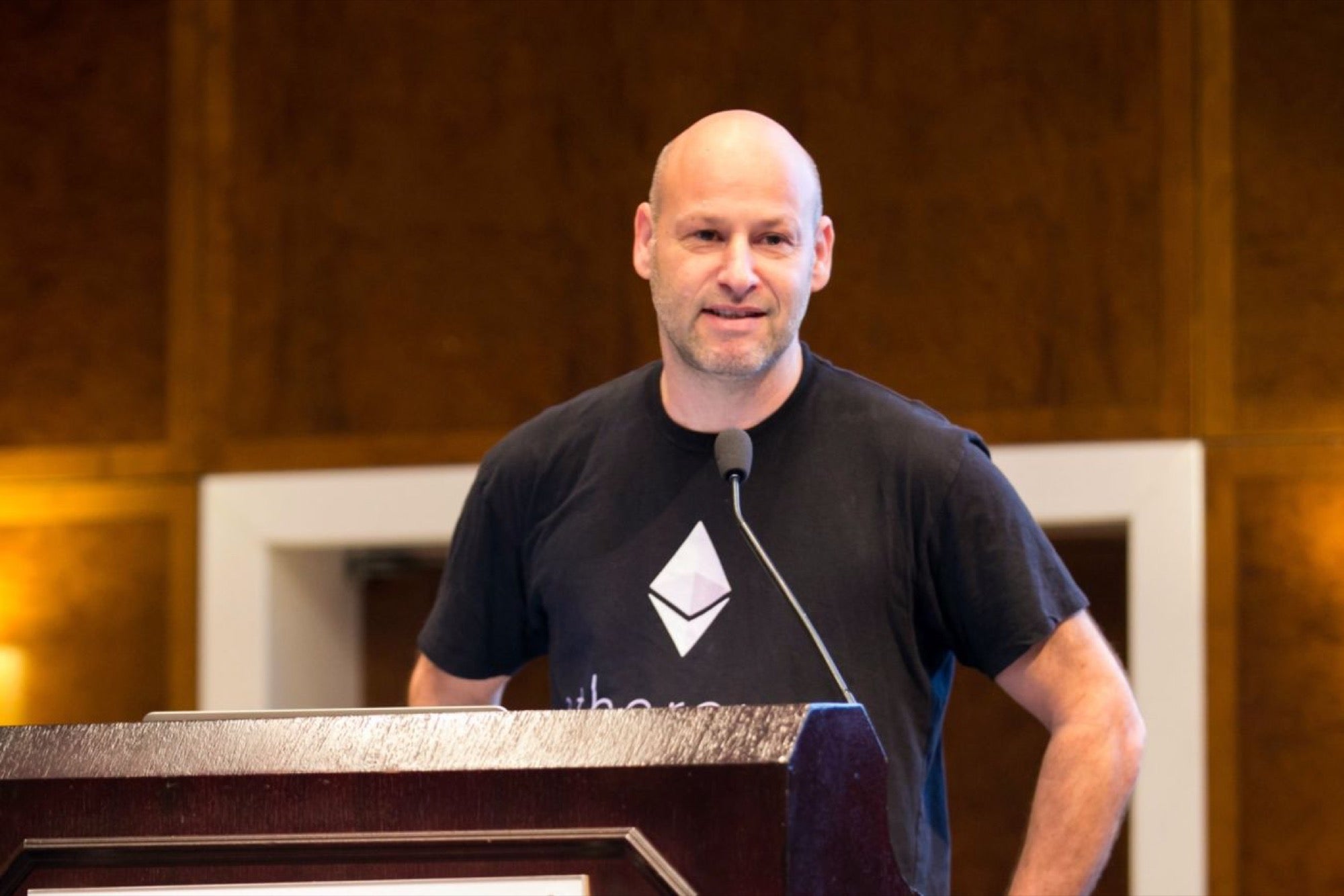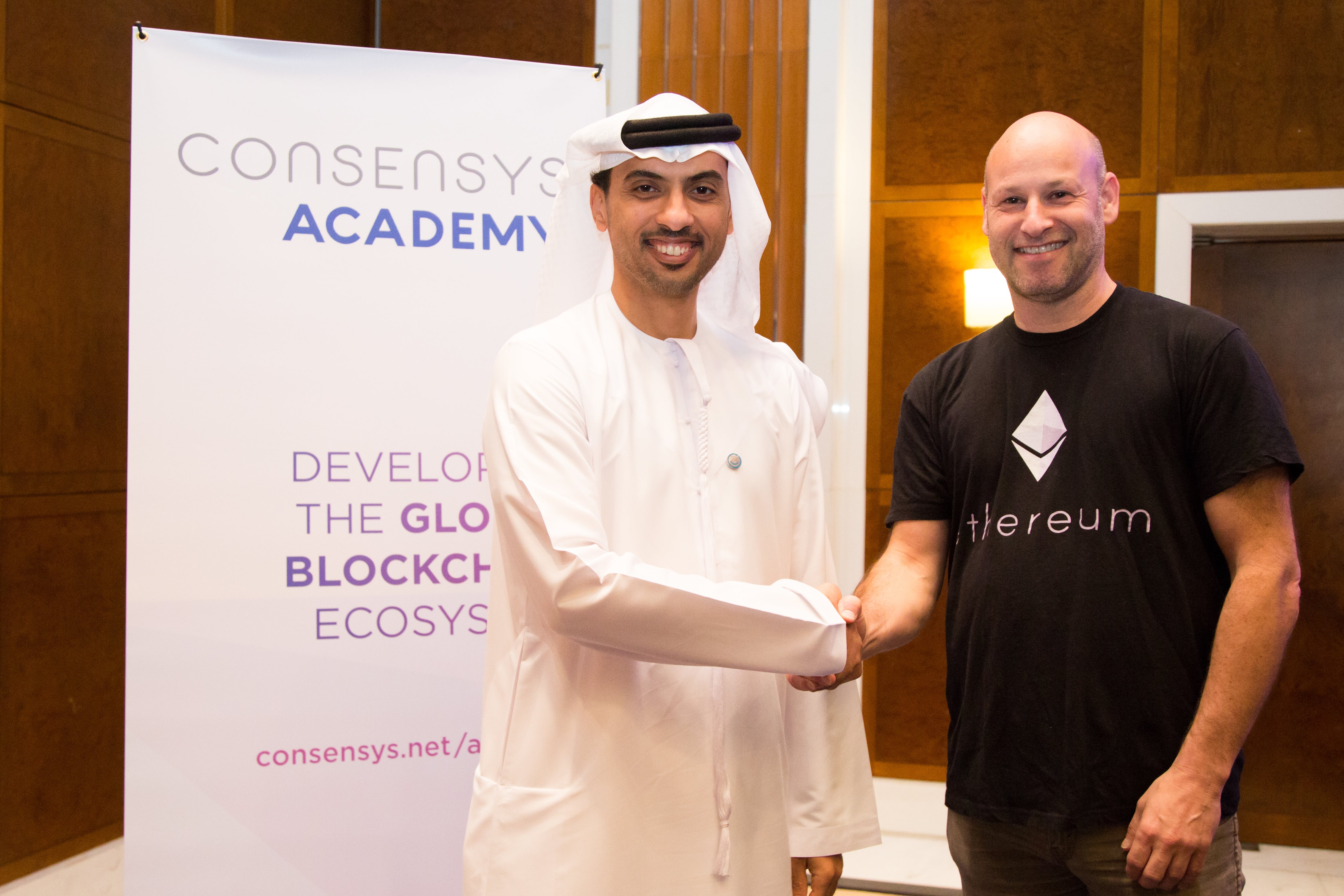How Dubai's Blockchain Advisor ConsenSys Is Creating A Community For The Emerging Tech As an incorruptible digital ledger of economic transactions, blockchain is emerging as a new type of internet innovation that enables distribution of digital information without being copied.
By Sindhu Hariharan •
Opinions expressed by Entrepreneur contributors are their own.
You're reading Entrepreneur Middle East, an international franchise of Entrepreneur Media.

JP Morgan CEO Jamie Dimon thinks bitcoin is a "fraud," business magnate Warren Buffett remains skeptical of cryptocurrency (He has reportedly said: "You can't value bitcoin because it's not a value-producing asset."), and Credit Suisse CEO Tidjane Thiam says bitcoin is "the very definition of a bubble." If these statements are any indication, there is a lot of skepticism in the world today about bitcoin, but it's interesting to note that the technology behind it –i.e. blockchain- has been marked out as the next big thing in the digital landscape. After all, blockchain is much more than just a platform hosting the polarizing cryptocurrency. As an incorruptible digital ledger of economic transactions, blockchain is emerging as a new type of internet innovation that enables distribution of digital information without being copied.
Take a look at ethereum, for instance, which is an open-source blockchain-based computing platform. Invented by programmer Vitalik Buterin, ethereum is a decentralized platform with capabilities to run smart contracts- in essence, contracts that can be executed exactly as programmed without possibility of fraud or third-party interference. Among the few startups that are working on ethereum-focused blockchain systems is ConsenSys, a New York-headquartered venture studio that offers tools for developers to build decentralized applications -otherwise called as Dapps (pronounced "dee-apps")- on ethereum.
The company was founded by Joseph Lubin, who today functions as its CEO- it's interesting to note here that Lubin was one of the seven co-founders who helped Buterin write up the code for the ethereum platform. With years of experience in the corporate world (including Goldman Sachs), and stints at a few high-tech startups after graduating from Princeton, Lubin got enamored by the blockchain concept, and thus became a banker who defected to "the other side." After getting the ethereum project off the ground, Lubin experimented with its various uses, and that led to the birth of Consensys in 2014. Growing exponentially since then, ConsenSys is today a leading name in the blockchain space, with around 450 employees across the globe.

Acting as a "hub" that nurtures various blockchain applications, the company and its founder are betting on ethereum's potential to reshape global economic transactions. While all this may seem like an indulgence of the developed world with emerging markets merely on the sidelines, the Arab world should be glad to know that ConsenSys was in fact lured to set up a presence right here in Dubai, a city that's fast turning into a key global center to realize blockchain's mainstream applications. ConsenSys is, in fact, the Blockchain City Advisor of Dubai under the Dubai Blockchain Strategy announced by H.H. Sheikh Hamdan bin Mohammed bin Rashid Al Maktoum, Crown Prince of Dubai and Chairman of the Dubai Executive Council, in October 2016.
"Early on, we were happy to speak about blockchain to anybody interested to listen," Lubin remembers. "Now, we are quite overwhelmed with all the people who want to hear about blockchain. When you are building a company in an ecosystem that doesn't exist yet, you have to do a lot of different things. You have to do education, a lot of hand holding in the form of consulting. So, we started getting calls pretty early on from companies and other entities, who wanted to learn about the technology." This was over a year ago, when ConsenSys was invited to be a part of the Dubai Future Accelerators (DFA), given their status as global blockchain experts, and the company has now established itself firmly in the city and the wider region as well. "A significant amount of our work has been done with Smart Dubai Office, where we have been helping a number of government entities understand how blockchain can help create exponential change making government services more effective and efficient, and enabling them to provide highest-quality services to citizens," Lubin says. "We have also completed a proof of concept for a land registry, and are highly engaged with the startup community here. We are excited to see that in the region, there are a lot of people passionate about cryptocurrency and blockchain technology."
The relationship has led to ConsenSys working on other projects with the Emirate, many of which aren't public information yet, says Lubin. "We are [in the process of] building out our new d3- based office in Dubai, in two months or so. We've maintained a presence of around 15 to 20 people [in Dubai], and our roadmap is to get to around 40 people, within, say, nine months." A few minutes into my conversation with Lubin, and it's easy to see that the entrepreneur truly believes that blockchain is going to change the world as we know it. "Our thesis is that this trusted infrastructure, which enables cooperating and competing actors like companies to share nonredundant infrastructure, enables governments to provide much more fluid, efficient, and transparent services." He notes that "very few states around the world are moving their infrastructure from frictional technologies (essentially pieces of paper and rubber stamps and ink), to native digital constructs," and one such nation with a head start is the UAE. "[UAE] is at the forefront because of a royal edict, delivered in the form of a tweet over a year ago, specifying the Emirate's intentions to bring all governmental transactions on the blockchain platform by 2020," Lubin notes.

Having launched quietly, without much fanfare, the program still managed to receive over 1,300 applications for its first batch. This list was narrowed down to 133 applicants; and around 120 of these engineers graduated in October. And what's worth highlighting is that around 25 of the inaugural graduating class were UAE-based. Indeed, the graduation ceremony for the inaugural batch took place in Dubai with the presence of delegates including H.E. Dr. Aisha Bint Butti Bin Bishr, Director General of Smart Dubai Office, Wesam Lootah, CEO of Smart Dubai Government Establishment, and other executives. "We were very interested [to have Middle East and UAE participation] in this first cohort," Lubin says. "We've got a lot of projects going on here [in the UAE], and are doing our best to spin up technologists here- both local and native- and also bring people here."
.jpg)
Whether it's the technical prowess of the team, or Lubin's own formidable experience in the world of ethereum, it's safe to say that ConsenSys has now become a magnet of sorts when it comes to attracting talent, and this is despite the fact that they didn't recruit for a long time. "We literally had people show up in our office and say they loved what we are doing; lot of people joined us in such a way," says Lubin. "As blockchain developers in legacy organizations, it can get a bit frustrating, so we are getting access to such people, as we started recruiting recently," he says. According to a recent Quartz report, three executives, (from BNY Mellon, Deutsche Bank, and PWC) undertaking blockchain work at their respective firms, are now either directly employed at ConsenSys, or will work on their own projects with ConsenSys funding. "As we scale, we are hiring the best and the brightest experts in entrepreneurship, finance, enterprise delivery, cryptography, blockchain development, game theory, and more from all over the world. Our only bottleneck is the supply of experts in blockchain compared to the much higher demand, in all parts of our business, which is why we started the educational hub ConsenSys Academy."
As ConsenSys strives to promote the potential of decentralizing technologies by building developer tools and solutions for governments and enterprises, it's likely that Dubai, as a city with access to tap this knowledge, will also inch closer to its blockchain goals. Lubin shares the sentiment. "From what we've seen, it's a very exciting time for a technologist to be here. It's kind of astonishing how focused [UAE is], compared to the rest of the world on being cutting-edge, and [how it] has a strong focus on creating a context in which the population can be better served and happier," he says.
"For a [blockchain] entrepreneur, especially developers, it's going to be a once-in-a-lifetime situation, where the kind of growth we'd see is going to create a shocking amount of value," he says, to entrepreneurs fascinated by the mysterious growing tech, urging them to reach out to ConsenSys for "developer tools, resources, and funding [you] need to build decentralized applications that will transform the world's economic, social and political systems." In fact, ethereum advocates envision the creation of an Internet 2.0 that hosts "decentralized app stores," where anyone can publish their Dapps that connect users and providers directly. And given Lubin's sentiment, it does make one feel that the day is not far when we move on from saying "there's an app for that" to "there's a DApp for that" for all that we need to doit's only a matter of time.
Related: Dubai Smart Government's Wesam Lootah On Leveraging Blockchain's Potential In The UAE












